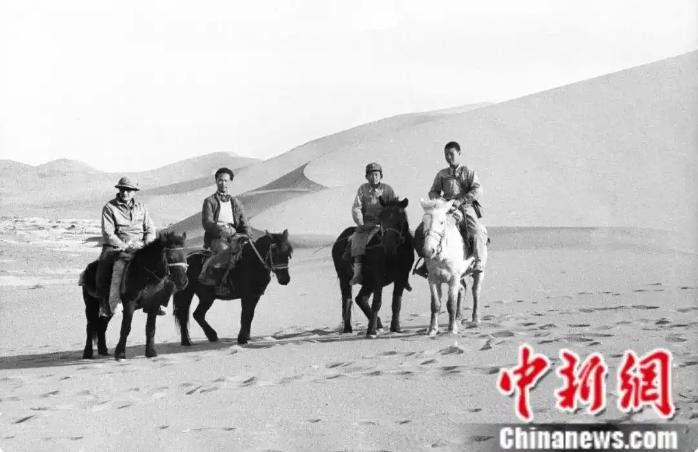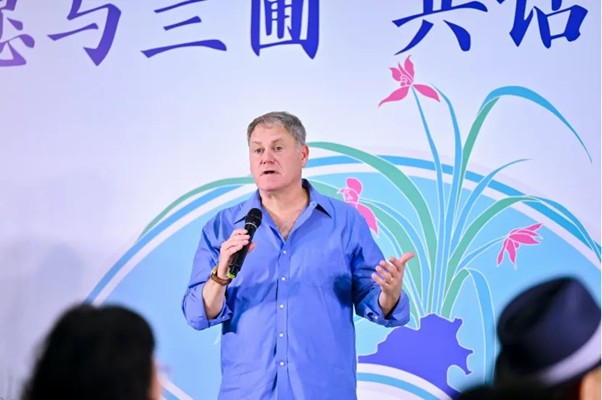This year marks the 20th anniversary of the proposal of the concept that ‘lucid waters and lush mountains are invaluable assets’, as well as the 10th anniversary of the Paris Agreement on climate change. In recent years, China’s achievements in ecological civilisation have garnered increasing attention and recognition from the international community. During his participation in the Second World Conference on Sinology in Shanghai, British author Carlos Martinez recently shared his observations and reflections on China’s ecological civilisation development with journalists. He contends that China’s substantial achievements in this field stem both from ecological concepts deeply rooted in Chinese tradition and from an unwavering commitment to people-centred governance principles.
Carlos Martinez, British writer, researcher and political activist. Author of The East is Still Red – Chinese Socialism in the 21st Century, The End of the Beginning. He currently serves as co-editor of the UK-based website Friends of Socialist China and sits on the Coordinating Committee of the International Manifesto Organisation. His scholarly contributions have appeared in academic journals including International Review of Thought and World Political Economy Review.

Since 2019, Martinez has visited China on seven occasions, travelling to cities including Beijing, Shanghai and Chongqing. Reflecting on his experiences, he remarked that what struck him most profoundly about China was not only its advanced road infrastructure but also its clean and orderly cities. Particularly in urban parks, he observed children playing and elderly people practising tai chi. This scene gave him the distinct impression of a peaceful, secure and friendly place. ‘Contemporary China bears no resemblance whatsoever to the stereotypical Western perceptions of dirtiness, disorder and substandard conditions. Indeed, one might even conclude that China represents the future.’
Martinez contends that the cleanliness and orderliness of Chinese cities are inseparable from the advancement of ecological civilisation, which in turn is intrinsically linked to the relationship between humanity and nature. He further analysed that the concept of ecological civilisation is deeply rooted in Chinese tradition. For instance, ideas such as ‘the unity of heaven and humanity’ and Xunzi’s notion that ‘all things find their harmony to live and their nourishment to flourish’, which emphasise the harmonious coexistence of humanity and nature and have established the ideological foundation for the Chinese people’s acceptance of ecological civilisation and created favourable conditions for policy implementation. In contemporary times, China’s adherence to a people-centred governance philosophy provides an indispensable framework for advancing ecological civilisation. This approach not only resonates with traditional thought but also aligns with the demands of modern development.

Martinez pointed out that in some Western nations, the political and economic spheres are manipulated by capital conglomerates, leading to situations where fossil fuel companies obstruct the implementation of green energy policies. This hinders the advancement of ecological civilisation. However, China will not experience such circumstances precisely because it adheres to a people-centred approach and has achieved an efficient transition from concept to practice.
Data indicates that by the end of June this year, China’s installed capacity of renewable energy exceeded 215.9 gigawatts, accounting for approximately 59.2 per cent of the nation’s total installed power generation capacity. Concurrently, China’s cumulative installed capacity for wind and solar power generation, alongside its forest stock volume, has already surpassed the targets set for 2030.

Martinez’s analysis suggests that China has genuinely achieved a balance between economic development and ecological sustainability through systematic investment in diverse green technologies and by prioritising key areas such as renewable energy, nuclear power, and biodiversity conservation at all levels of government and society. While China’s accomplishments in environmental protection and sustainable development have drawn global attention, with the world now anticipating China to play a greater role in addressing environmental challenges.
Martinez stated that in the face of the current impasse in global climate governance, China’s achievements in ecological civilisation demonstrate that economic development and environmental protection are not mutually exclusive. ‘All nations worldwide, particularly developing countries, stand to benefit from China’s ecological civilisation philosophy and innovative practices.’
If you like this article why not read: Jean-Jacques Annaud: Bridging Cultures Through Film











